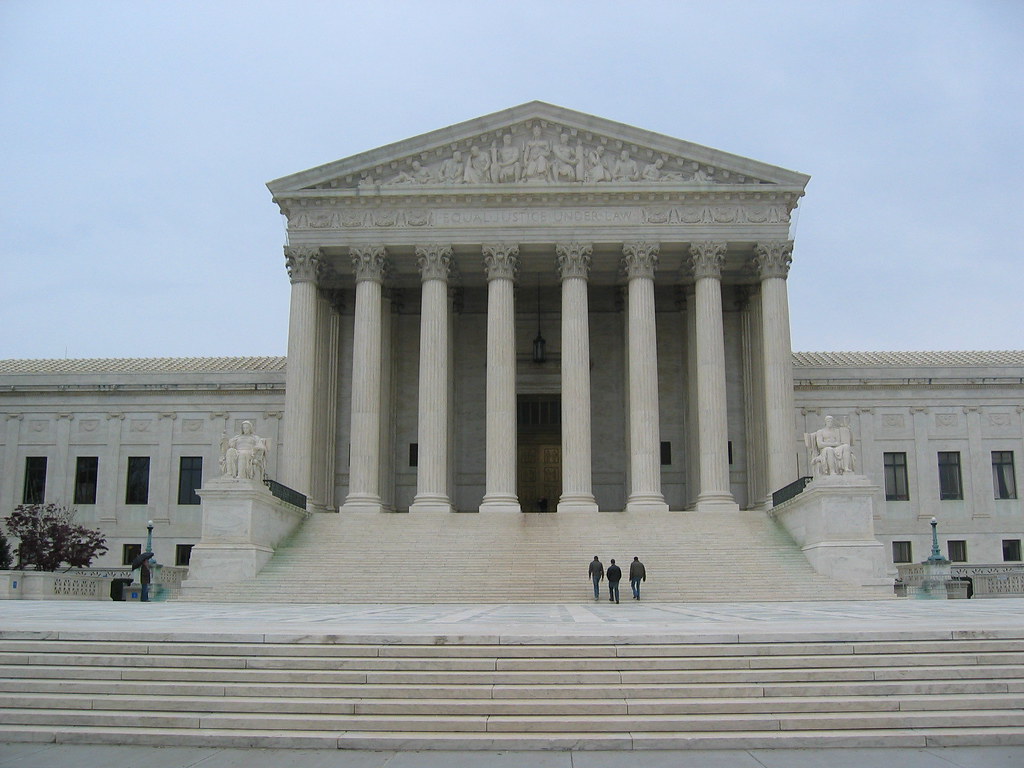After Dobbs, Democrats and Republicans Switch Places on Speech Policy
Republicans have long advocated against platform censorship, while Democrats have favored more restrictions on speech. In the wake of the Supreme Court’s decision, both parties are now pushing speech policies they once argued against.

Published by The Lawfare Institute
in Cooperation With

The Supreme Court’s decision overturning Roe v. Wade is likely to have a sweeping effect on abortion and privacy, but it will also set the stage for a battle over what people can and can’t say online. Democrats and Republicans are already positioning themselves for this fight, with many on both sides reversing long-held positions on online speech policy in order to score political points. But users will be better served by policymaking that takes a longer view.
Since the 2016 election, Republicans have sought to narrow the scope of online platforms’ ability to moderate content. They introduced dozens of bills in Congress that would narrow Section 230 of the Communications Decency Act, which protects platforms from liability for content posted by their users. They have also been active in state legislatures, with Florida and Texas passing laws that limit platforms’ power to moderate content. And the judiciary has gotten involved too, with conservative judges—including Justices Samuel Alito and Clarence Thomas—signaling support.
Democrats have also advocated for reforms. But while Republicans have pushed for less censorship, Democrats have pushed for more. They proposed reforms that would expand platforms’ liability for content posted by their users, such as by removing protections for certain categories of harmful speech or by making platforms liable for content ordered by an algorithm. Like Republicans, Democrats have responded to the slow pace of reform in Congress by turning to statehouses. After the mass shooting in Buffalo in May, numerous press reports highlighted the shooter’s online activity, and New York subsequently passed a law requiring platforms to monitor and report online hate speech.
In the wake of the Supreme Court’s Dobbs decision, however, many Republicans and Democrats are reversing their positions, with Republicans championing reforms that would increase censorship and Democrats seeking to protect speech from platform interference. Republicans are circulating model bills for state legislatures that include criminal penalties for “giving instructions over … the internet … regarding self administered abortions or means to obtain an illegal abortion.” Republicans in South Carolina have already introduced legislation that would criminalize “hosting or maintaining an internet website … purposefully directed to a pregnant woman who is a resident of this State that provides information on how to obtain an abortion.”
Democrats, by contrast, are expressing concerns about platform censorship of abortion-related speech. Last week, Sens. Amy Klobuchar and Elizabeth Warren wrote a letter to Meta, highlighting reports that abortion-related posts had been censored, “often within minutes” of being posted.
Ironically, the anti-censorship laws that Republicans have been pushing would now complicate their effort to compel platforms to censor abortion-related speech. Likewise, Democrats’ proposals to erode liability protections would make it harder for platforms to host the speech they now want to protect, since it exposes them to potential prosecution in states like Texas and Florida.
The parties’ shifting positions on speech have even spilled over to antitrust issues. Sen. Klobuchar’s proposed American Innovation and Online Choice Act prevents Big Tech companies from favoring their own products over others, and is now being actively considered in the Senate. Democrats have championed antitrust reform, but a number of scholars, think tanks, and legislators have pointed out that the bill would likely restrict platforms’ ability to take basic steps to moderate content, such as by downranking sites like Breitbart and Infowars relative to sites like the Wall Street Journal and the Washington Post.
The bill’s restrictions on content moderation have helped Democrats to find bipartisan support for the proposal, with some Republicans viewing it as a tool for addressing their concerns about censorship. While this support may increase the odds of passing the bill, it is likely to come at a steep cost, making it harder for platforms to remove abortion-related misinformation.
When it comes to the issue of surveillance, however, Republicans and Democrats have hewed closer to their traditional positions. According to Gallup’s recent poll of confidence in institutions, Republicans typically are more trusting of law enforcement and more supportive of broad government authority to access data for use in investigations and prosecutions, while Democrats typically are more skeptical of law enforcement and more protective of civil liberties in the face of government requests for data.
In the weeks since Dobbs, Republicans have signaled support for states’ ability to access data that will help them to prosecute cases under state law, and Democrats have been concerned about the impact of enabling these prosecutions on privacy, reproductive autonomy, and health care. Six Democrats wrote a letter to Oracle and Amazon Web Services asking about how the companies planned to protect data that might be used in state prosecutions. Warren has also drawn attention to data brokers’ sale of the location data of people who visit abortion clinics. Of course, whether these positions will hold in the face of new facts—for example, if the New York attorney general was seeking data to prosecute someone who traveled from Texas to a New York abortion clinic to harass people seeking lawful abortions there—is yet to be seen.
The shifting sands beneath each party’s position on content moderation in the wake of Dobbs suggest the dawn of a new phase in tech policy. The past 15 years in tech policy have been defined by two periods. The first, between 2007 and 2016, was rooted in optimism: U.S. policymakers preached the benefits of internet freedom, with public policy oriented toward limited censorship, limited interference in the flow of data across borders, and limited government surveillance.
The second, which developed quickly in the wake of the 2016 election, was defined by its pessimism: Powerful platforms distorted the online experience, ignoring harmful misinformation and exercising power through indiscriminate censorship. Internet freedom was replaced by a push toward internet regulation, with Europe’s more stringent protections held up by many as the ideal global model.
The redrawing of speech battle lines between the parties suggests the beginning of a new phase. This new phase seems likely to be defined by the intensity of the disagreements about what people should be permitted to say online, with abortion-related speech serving as a proxy for how people value life, privacy, and gender. It also seems likely to be characterized by a shift in power from the federal government to the states, with states becoming even more active in setting and implementing the tech policy agenda. Whatever the specifics of this phase may be, it will shape the evolution of the tech sector in the years ahead.
This uncertainty points to the value of incremental reforms. Dramatic changes—like repealing platform liability protections or prohibiting platforms from moderating content—will almost certainly make tech products worse for most users, and might not hold up well over the long run. As already seen in the wake of Dobbs, Democrats who favor more restrictive content moderation today may be more protective of speech tomorrow, and Republicans who seek common carrier-style laws today may prefer more restrictive moderation tomorrow. Instead of overhauling the laws that govern speech online, policymakers should focus on reforms that enable them to learn more about abortion-related online content, to target the most harmful speech, and to invest in the health of information ecosystems.
For instance, policymakers might consider options that will enable them to learn more about what people are saying and doing online, including the impact of misinformation on women’s health. They could create multistakeholder commissions—composed of industry, academic, and nonprofit representatives—to gather data from platforms, study the issue, and publish reports on their findings. Or they could create regulatory sandboxes that enable platforms to experiment with content interventions aimed at addressing abortion-related misinformation. Learning will be critical at a time when so much is in flux.
Policymakers might also consider updating federal criminal law that could help deter violence in the wake of Dobbs. Federal law prohibiting incitement to riot was passed in the late 1960s but has not been updated to reflect new communication technologies. Since anti-abortion and abortion-rights advocates could be the victims of violence, Republicans and Democrats should work together to update this law to ensure that it deters the use of online tools to foment offline violence. One benefit of passing new federal criminal law is that platforms can’t use Section 230 as a defense in federal criminal cases.
Finally, policymakers should invest in stronger online information ecosystems, such as by increasing funding for government communication departments and providing media literacy training in schools and communities. Those types of policy initiatives are often deeply unsatisfying to politicians looking for aggressive reforms that will rally their bases. But even if they lack the appeal of more strident appeals for or against censorship, deep investments in the long-run health of information environments are likely to pay significant dividends.
The parties’ shifting positions also suggest that one important task in the wake of Dobbs will be to preserve the foundational tenets of internet law, such as liability protections for content hosts and robust First Amendment safeguards. These provisions protect controversial speech on heated topics, allow platforms room to adjust their content policies in response to changing circumstances, and permit prosecutions against perpetrators of harm. In the midst of social and political upheaval, those features of existing law will be critical.
The Dobbs decision has sparked a flurry of activity aimed at scoring political points in the short term. Policymakers should instead consider reforms that will bolster the health of online information ecosystems over the long run.




